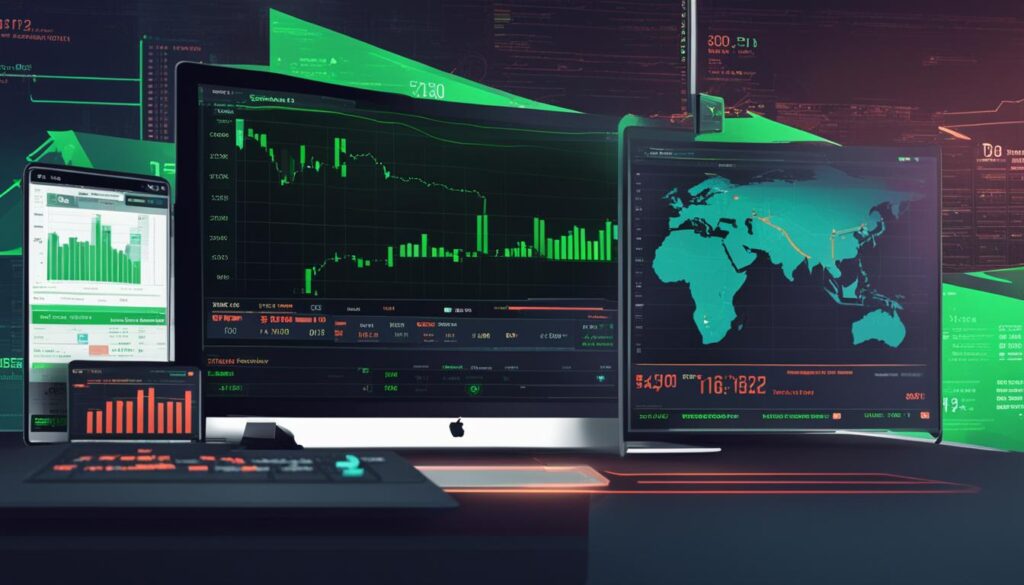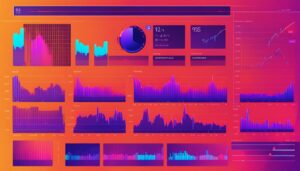Welcome to my guide on how to make money trading Forex. In this article, I will provide you with valuable tips and strategies to help you succeed in the Forex market. Whether you are a beginner or an experienced trader, understanding the Forex market and implementing effective trading strategies is the key to earning cash.
Forex trading involves buying and selling currencies on the foreign exchange market with the goal of making a profit. To increase your chances of success, it is important to understand the basics of how the market works and what factors influence currency movements. This knowledge will enable you to develop effective trading strategies and make informed decisions.
Key Takeaways:
- Understanding the Forex market is crucial for making money through trading.
- Developing effective trading strategies based on market analysis is essential.
- Stay informed about currency movements and economic indicators.
- Implement risk management principles to protect your capital.
- Continuous learning and disciplined approach are key to Forex trading success.
How Does Making Money Trading Forex Work?
Foreign exchange trading, also known as forex trading, involves buying and selling currencies in pairs at an exchange rate. As a forex trader, understanding how to profit from these currency fluctuations is essential. Let’s explore the concept of trading forex and how it can generate profits.
When trading forex, you’ll encounter currency pairs such as EUR/USD (Euro/US Dollar) or GBP/JPY (British Pound/Japanese Yen). Each currency pair represents the exchange rate between two currencies. The exchange rate determines how much of one currency you can buy or sell in relation to another.
For example, let’s say the EUR/USD exchange rate is 1.20. If you believe the Euro will increase in value compared to the US Dollar, you might open a long position on this currency pair.
Opening a long position means you are buying the base currency (Euro) and selling the quote currency (US Dollar). If the exchange rate rises to, let’s say, 1.25, you can sell your Euros, buying back US Dollars at a more favorable rate. The difference between the buying and selling prices represents your trading profit.
On the other hand, if you believe the Euro will decrease in value, you can open a short position. This means selling the base currency (Euro) and buying the quote currency (US Dollar). If the exchange rate drops, you can repurchase the Euros at a lower rate, earning a profit.
Successful forex trading involves analyzing the market to determine favorable trade setups. Traders use various strategies, technical indicators, and fundamental analysis to identify potential moves in the market. These strategies help them make informed decisions and increase the likelihood of generating profits.
Let’s summarize the key points:
- Forex trading involves buying and selling currency pairs at an exchange rate.
- A long position is taken when you expect the base currency to increase in value.
- A short position is taken when you expect the base currency to decrease in value.
- Successful forex trading requires analysis and strategic decision-making.
“The foreign exchange market offers numerous opportunities for traders to profit from currency fluctuations. By understanding how currency pairs and exchange rates work, traders can take advantage of movements in the forex market and generate trading profits.”
Now that we have explored the basics of making money trading forex, let’s delve into some simple tips and strategies that can further enhance your success in the forex market.
| Tips for Making Money Trading Forex |
|---|
| 1. Develop a sound trading plan based on research and analysis. |
| 2. Use risk management techniques to protect your capital. |
| 3. Stay informed about economic news and events that can impact currency movements. |
| 4. Practice discipline and emotional control to avoid impulsive trading decisions. |
| 5. Continuously learn and adapt your strategies based on market conditions. |
| 6. Seek guidance from experienced traders or mentors to accelerate your learning curve. |
By following these tips and implementing a structured approach to forex trading, you can increase your chances of success and maximize your trading profits.
6 Simple Tips for Making Money Trading Forex
As a beginner in forex trading, it is essential to familiarize yourself with common trading terms and concepts. By understanding these terms, you can navigate the forex market effectively and increase your chances of making money. Let’s explore six simple tips to get you started:
- Currency Pairs: Forex trading involves buying and selling currency pairs. A currency pair represents the exchange rate between two currencies. For example, EUR/USD represents the exchange rate between the Euro and the US Dollar. Familiarize yourself with different currency pairs to understand their behavior and trading opportunities.
- Point in Price (PIP): A pip is the smallest unit of movement in a currency pair’s exchange rate. It represents the fourth decimal place in most currency pairs. For example, if the EUR/USD exchange rate moves from 1.2500 to 1.2505, it has increased by 5 pips. Understanding pips is crucial for measuring and managing risk.
- Bid and Offer: In forex trading, the bid price refers to the exchange rate at which you can sell a currency pair, while the offer price represents the rate at which you can buy the currency pair. The bid is lower than the offer, and the difference between the two is known as the spread.
- Spread: The spread is the difference between the bid and offer prices. It is essentially the cost of trading and varies depending on the currency pair and the broker. Understanding the spread is crucial for managing trading costs and maximizing profitability.
- Lots: Lots refer to the minimum trading unit in forex. Standard lots are typically 100,000 units of the base currency, while mini lots are 10,000 units, and micro lots are 1,000 units. Lots determine the size of your trades and the potential profit or loss.
- Useful Resources: To delve deeper into the world of forex trading terms and concepts, you can refer to reputable educational resources and trading platforms. These resources offer comprehensive explanations and examples to enhance your understanding and proficiency in forex trading.
By familiarizing yourself with these basic forex trading terms, you will develop a solid foundation for successful trading. Remember, continuous learning and practice are essential for honing your skills and making profitable trades.
| Term | Description |
|---|---|
| Currency Pairs | The exchange rate between two currencies |
| Point in Price (PIP) | The smallest unit of movement in a currency pair’s exchange rate |
| Bid and Offer | The exchange rate at which you can sell or buy a currency pair |
| Spread | The difference between the bid and offer prices |
| Lots | The minimum trading unit in forex |
Find a Reputable Forex Broker
Choosing a reliable forex broker is crucial for successful trading. When it comes to forex trading, your broker plays a significant role in your overall experience and potential profitability. It’s essential to find a broker that meets your specific needs and offers the necessary tools and support.
One of the key factors to consider when selecting a forex broker is regulation. Ensure that the broker you choose is regulated by a reputable financial authority. Regulation provides a level of security and ensures that the broker operates within specific guidelines, protecting your interests as a trader.
Another important consideration is the broker’s trading platform. A user-friendly and efficient trading platform is essential for executing trades effectively. Look for a broker that offers a platform that suits your trading style and preferences. Take advantage of demo accounts or trial periods to test different platforms and find the one that best suits your needs.
Spreads are another crucial aspect to evaluate. Spreads refer to the difference between the buying (bid) and selling (ask) prices of a currency pair. Lower spreads can be more cost-effective for traders, as they reduce the cost of entering and exiting trades. Look for a broker that offers competitive spreads, allowing you to optimize your profitability.
Additionally, consider the level of customer support provided by the broker. Reliable customer support is essential for addressing any issues or concerns that may arise during your trading journey. Choose a broker that offers multiple support channels, such as phone, email, and live chat, and ensure that they have a reputation for responsive and helpful customer service.
By carefully evaluating these factors, you can find a reputable forex broker that meets your trading needs and provides the necessary support for your success. Remember, the broker you choose can significantly impact your trading experience, so take the time to research and select wisely.
Start With a Demo Account
Before diving into live trading, it is recommended to start with a demo account. This allows you to practice trading strategies and familiarize yourself with the trading platform without risking real money.
Using a demo account provides a risk-free environment where you can experiment with different trading strategies and gain valuable experience. Whether you are a beginner or an experienced trader, a demo account is an essential tool for honing your skills and improving your trading performance.
By utilizing a demo account, you can:
- Practice Trading: Demo accounts offer the opportunity to execute trades in real-time, allowing you to gain a practical understanding of how trades are executed and managed.
- Test Different Strategies: Experiment with various trading strategies and techniques without the fear of losing money. Identify which strategies align with your trading style and deliver consistent results.
- Familiarize Yourself with the Trading Platform: Get acquainted with the features and functionality of the trading platform you will be using. Learn how to place trades, set stop-loss orders, and monitor market movements.
- Develop Risk Management Skills: Learn how to effectively manage risk by setting appropriate stop-loss levels and implementing risk management strategies. Practice controlling your emotions and maintaining discipline in managing your trades.
Utilizing a demo account is an invaluable step in your journey towards becoming a successful forex trader. It allows you to gain confidence and refine your skills before transitioning to a live account, where real money is at stake.

Remember, the goal of starting with a demo account is to develop a solid foundation and an effective trading strategy that will help you navigate the forex market with confidence and success.
Begin With a Small Investment
When it comes to live trading, starting with a small investment is a wise decision. By doing so, you ensure that you are not risking more than you can afford to lose. Managing risk effectively becomes easier when you trade with a small investment, allowing you to navigate the market with confidence.
Trading capital plays a crucial role in determining the level of risk you can comfortably take. Choosing an investment size that aligns with your risk tolerance is essential for long-term success in forex trading. It allows you to maintain emotional control and make strategic decisions based on sound risk management principles.
As you gain experience and confidence in your trading abilities, you can gradually increase your investment size. This progressive approach helps you adapt to market conditions and refine your trading strategies as you grow.
| Benefits of Small Investments | Importance |
|---|---|
| Minimizes Risk | Starting with a small investment ensures that you don’t risk more than you can afford to lose. |
| Effective Risk Management | Trading with a small investment allows for better risk management and emotional control. |
| Adaptable Learning | A smaller investment size enables traders to adapt their strategies and learn from real market experiences. |
By beginning with a small investment, you set the foundation for long-term success in forex trading. It gives you the opportunity to practice risk management, refine your trading skills, and gradually build your trading capital over time.
Conclusion
In conclusion, achieving success in forex trading relies on a combination of essential factors. Firstly, continuous learning is crucial in keeping up with the dynamic nature of the market. As traders, we must stay informed about market trends, economic indicators, and the latest trading strategies. This ongoing education allows us to adapt and make informed decisions.
Risk management is another vital aspect of profitable forex trading. By developing and sticking to a well-defined trading plan, we can effectively manage our risk exposure. This includes setting stop-loss orders, determining position sizes, and diversifying our trading portfolio. Implementing risk management strategies ensures that we protect our capital and minimize potential losses.
Additionally, maintaining a disciplined approach is key to long-term success in forex trading. Emotions can cloud judgment and lead to impulsive trades. By following a disciplined trading routine, we can avoid making emotional decisions and stick to our predetermined strategy. This discipline helps us stay focused and make rational choices based on thorough analysis rather than momentary fluctuations.
By applying a combination of continuous learning, risk management, and a disciplined approach, we can increase our chances of achieving forex trading success. Remember, the forex market is highly competitive, but with dedication and persistence, we can navigate its complexities and capitalize on profitable opportunities.
FAQ
How does forex trading work?
Forex trading involves buying and selling currencies in pairs at an exchange rate. Traders can open long positions to profit from exchange rate increases or short positions to profit from exchange rate drops.
What are some important forex trading terms?
Important terms in forex trading include currency pairs, pips (point in price), bid, offer, spread, and lots. Understanding these terms is crucial for navigating the forex market effectively.
How can I find a reputable forex broker?
Look for a regulated broker with a good reputation in the industry. Consider factors such as their trading platform, competitive spreads, and customer support.
Should I start with a demo account?
Yes, starting with a demo account allows you to practice trading strategies and familiarize yourself with the trading platform without risking real money.
How much should I invest when starting live trading?
It is advisable to start with a small investment that you can afford to lose. As you gain experience and confidence, you can increase your investment size.
What is the key to success in forex trading?
Success in forex trading requires knowledge, skill, discipline, and continuous learning. It is important to develop a trading plan, practice risk management, and stay informed about market trends and economic indicators.





